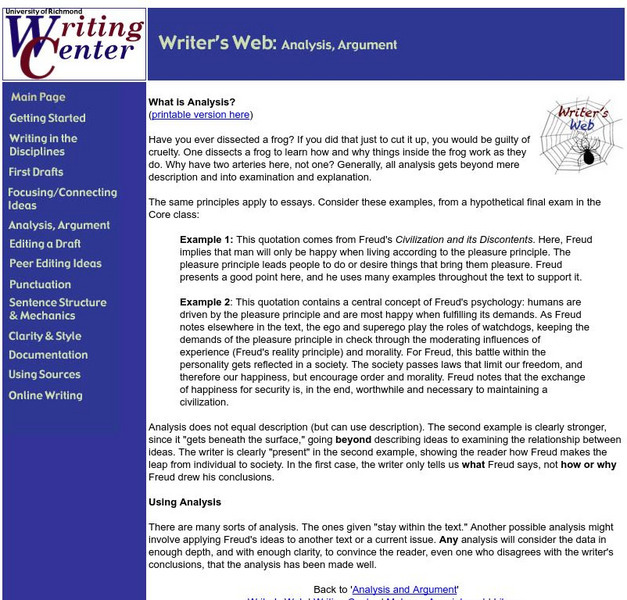Lumen Learning
Lumen: Writing Process: Finding Evidence
This instructional activity focuses on finding evidence to support your thesis, how to incorporate your findings into your own work, and how to effectively quote, paraphrase, and summarize your information. CCSS.ELA-Literacy.CCRA.W.9,...
Lumen Learning
Lumen: Analysis: Rhetorical Analysis
This lesson focuses on defining rhetorical analysis and identifying and applying different types of analytic processes. It also provides a practice activity.
Lumen Learning
Lumen: Multimodality: Remix and Attribution
This lesson focuses on defining remix, why attribution is important in a remix, and how to attribute fairly. It also provides a table, Limitations When Remixing Copyrighted Work, and a practice exercise. CCSS.ELA-Literacy.CCRA.W.8
Other
Learning and Tutoring Center: Literary Analysis Thesis [Pdf]
Learn how to write a literary analysis thesis. [PDF]
Other
Critical Reading: Inference and Analysis
This site defines inference and analysis. It explains how analysis works, goals of analysis, levels, bases, and how to analyze text. RL.9-10.1, RL.11-12.1, RI.9-10.1 textual evidence and inferences, RI.11-12.1 textual evidence and...
Texas Education Agency
Texas Gateway: Informational Text: Analyze an Argument: Practice 1
When you read an argumentative essay or article, you should analyze the author's evidence. However, you can't analyze the evidence a writer gives in support of a position if you don't know the author's perspective.
Better Lesson
Better Lesson: W.3.2: Write Informative/explanatory Texts to Examine a Topic
Links to 56 lessons and activities that build student skills in standard W.3.2: Write informative/explanatory texts to examine a topic and convey ideas and information clearly.
Annenberg Foundation
Annenberg Learner: Reading Like a Historian
During this 8-day unit, students will engage in collecting text evidence and then writing about their findings. They will answer the following question with credible, well-explained evidence: Why did Andrew Jackson and Elias Boudinot...
Texas Education Agency
Texas Gateway: Annotate and Analyze a Paired Passage: Practice 1
In this lesson, you will read and annotate a pair of texts to make inferences, draw conclusions, and synthesize ideas and details using textual evidence. Prepare to get involved in a conversation between you and the two texts you will be...
Texas Education Agency
Texas Gateway: Annotate and Analyze a Paired Passage: Practice 2
[Accessible by TX Educators. Free Registration/Login Required] In this lesson, you will read and annotate a pair of texts to make inferences, draw conclusions, and synthesize ideas and details using textual evidence.
Texas Education Agency
Texas Gateway: Annotate and Analyze a Paired Passage: Practice 1
In this lesson, you will read and annotate a pair of texts to make inferences, draw conclusions, and synthesize ideas and details using textual evidence. You are going to look at two texts together to better understand them.
Other
Chateauguay Valley Regional High School: The Past Through Poetry by Mary Sully
This is a good example of how to write a literary analysis essay on poetry. This example compares and contrasts Tennyson and Yeats, Victorian poets, on the basis of their lives and their poetry. W.9-10.9a Analysis
Other
Brock University: Critical Reading: A Guide
In addition to thoroughly exploring the purposes and functions of an analytical essay, this resource provides students with step-by-step instructions for reading and analyzing poetry, prose-fiction, and fiction. The site also offers...
Florida Center for Reading Research
Florida Center for Reading Research: Text Analysis: Inference Innovations [Pdf]
A lesson plan in which students read a text and use a graphic organizer to make inferences. Materials are included.
Florida Center for Reading Research
Florida Center for Reading Research: Text Analysis: Incredible Inferences [Pdf]
A lesson plan in which students play a game by covering places on a board while making inferences. Materials are included.
Florida Center for Reading Research
Florida Center for Reading Research: Exp. Text Structure: Reading the Research
A lesson plan in which students review reference materials looking for answers to specific questions. Materials are included.
Florida Center for Reading Research
Florida Center for Reading Research: Compare a Story [Pdf]
A lesson plan in which students read two narrative texts and complete graphic organizers to compare and contrast the texts. Materials are included.
Florida Center for Reading Research
Florida Center for Reading Research: Check a Trait
A lesson plan in which young scholars read a narrative text and complete a graphic organizer to describe the characters in the story. Materials are included. [PDF]
Folger Shakespeare Library
"To Be or Not to Be": Close Reading Hamlet's Soliloquy
From the Folger Shakespeare Library, this lesson plan requires students to analyze Hamlet's soliloquy with an emphasis on word meaning and etymology. They then compare two film versions of the speech.
Florida Center for Reading Research
Florida Center for Reading Research: Expository Text Structure: Research Roundup
A lesson plan in which students complete graphic organizers as they gather research information. Materials are included.
Louisiana Department of Education
Louisiana Doe: Curriculum Hub: Ela Guidebooks: Teenage Brain: Reflect on Composing Work
Reflect on how composing your work contributed to understanding the question "Should parents limit their teen's access to social media?"
Louisiana Department of Education
Louisiana Doe: Curriculum Hub: Ela Guidebooks: Teenage Brain: Teen Decision Making and Behavior
Students research an age restricted privilege/right such as driving, drinking, and voting. Students conduct research to answer questions including: Why was the age limit for your privilege determined? When was it determined? Students use...
University of Richmond
University of Richmond: What Is Analysis?
This site from the University of Richmond defines analysis through two sample paragraphs. It also contains a brief section on using analysis. A very brief site, but good, factual information is provided.
Other
Huxley: "Brave New World": A Defense of Paradise Engineering
This site provides a literary analysis of Aldous Huxley's book "Brave New World". Check it out.W.9-10.9a Analysis, W.11-12.9a


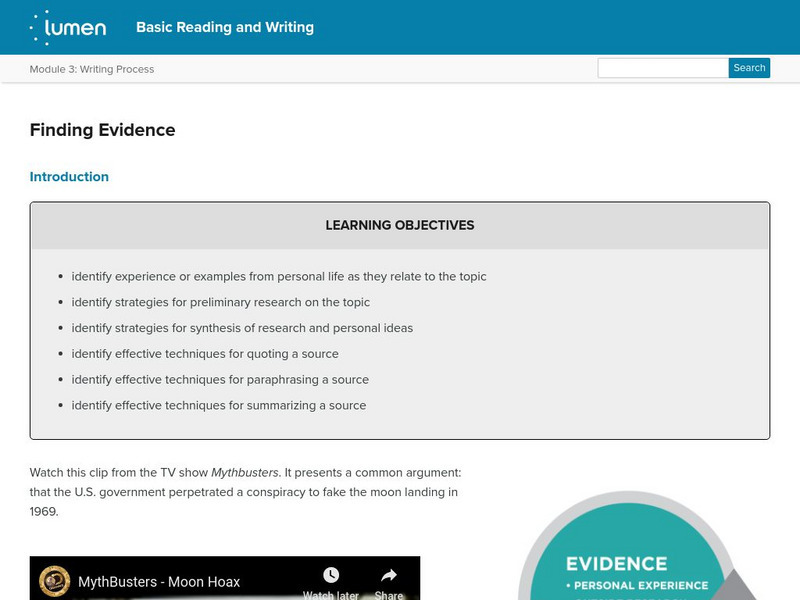


![Learning and Tutoring Center: Literary Analysis Thesis [Pdf] Handout Learning and Tutoring Center: Literary Analysis Thesis [Pdf] Handout](https://d15y2dacu3jp90.cloudfront.net/images/attachment_defaults/resource/large/FPO-knovation.png)
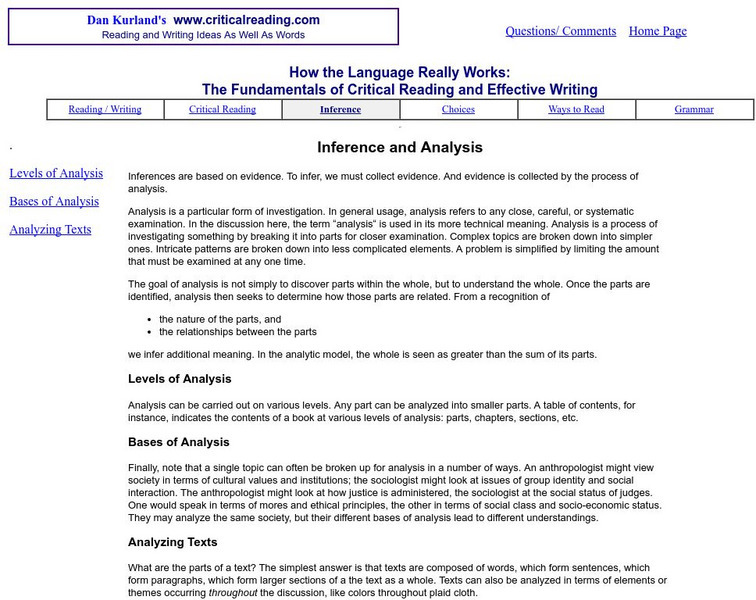


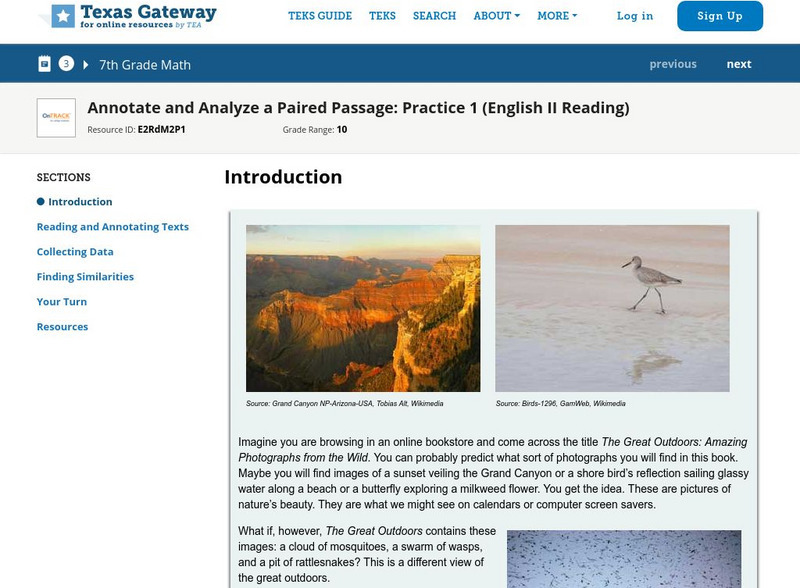
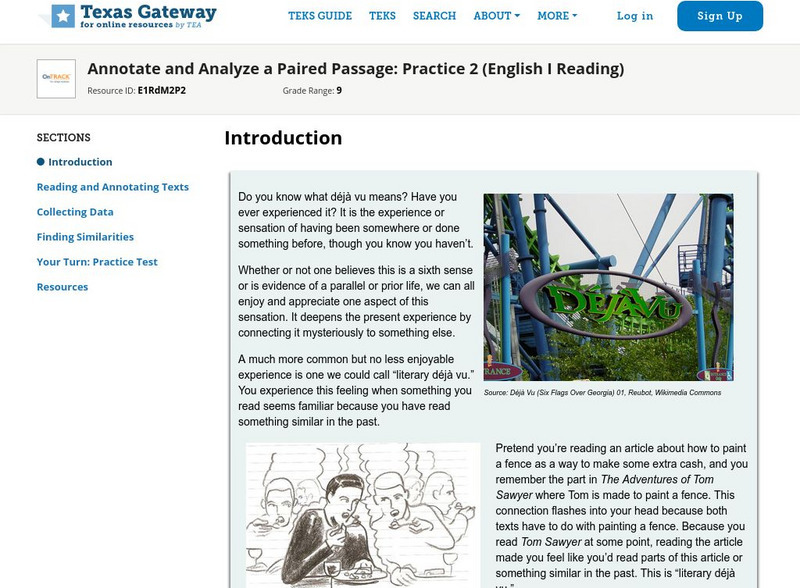
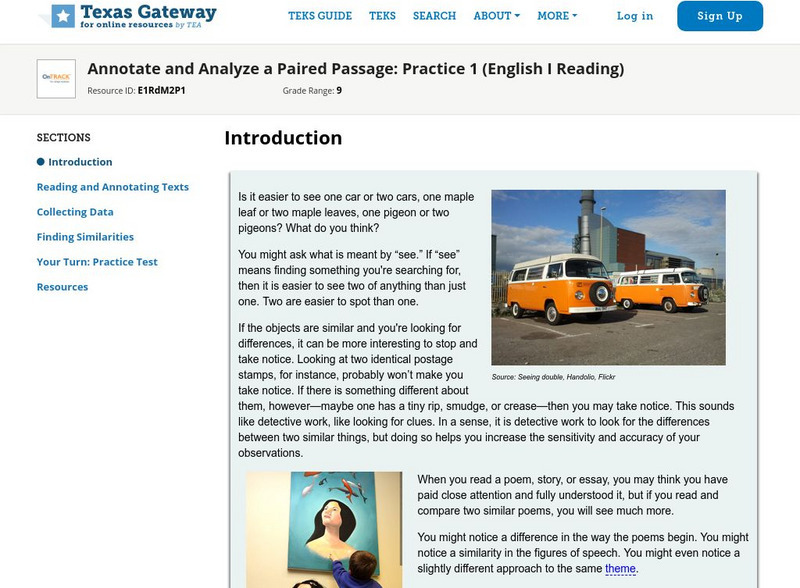
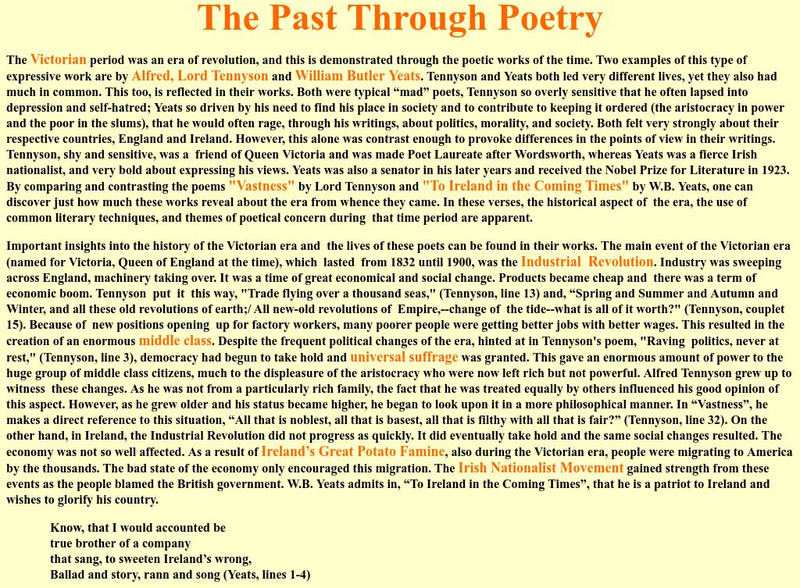
![Florida Center for Reading Research: Text Analysis: Inference Innovations [Pdf] Lesson Plan Florida Center for Reading Research: Text Analysis: Inference Innovations [Pdf] Lesson Plan](https://content.lessonplanet.com/knovation/original/509090-40e85c5bfbfa31dce3d470a549282f99.jpg?1661786988)
![Florida Center for Reading Research: Text Analysis: Incredible Inferences [Pdf] Lesson Plan Florida Center for Reading Research: Text Analysis: Incredible Inferences [Pdf] Lesson Plan](https://content.lessonplanet.com/knovation/original/509101-bb8c554899d4d9c53e422b2a416a2b4c.jpg?1661786972)

![Florida Center for Reading Research: Compare a Story [Pdf] Lesson Plan Florida Center for Reading Research: Compare a Story [Pdf] Lesson Plan](https://content.lessonplanet.com/knovation/original/509121-722cc575e77e43ee6a83a0f1f3dc0ec0.jpg?1661786941)


